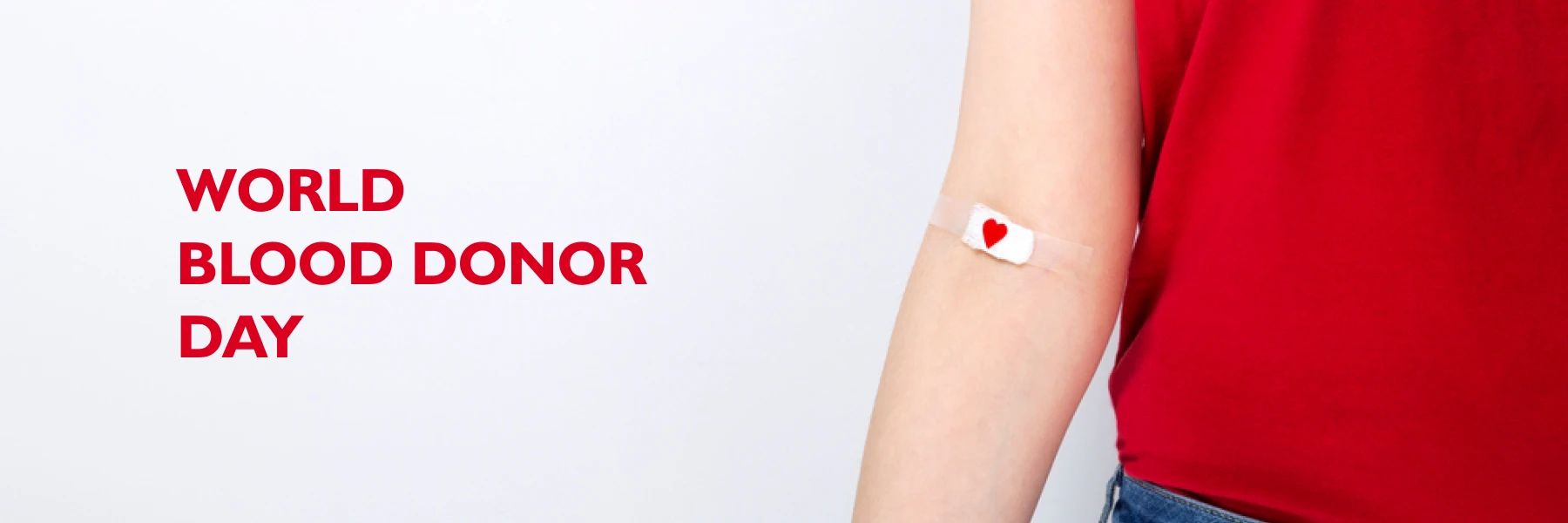
Donate blood and save three lives!
From one single donation, three components are prepared and thus one blood donor can save three precious lives. This World Blood Donor Day, let's pledge to make blood transfusions safe and available to everyone who needs it.
Let's bond over blood!
This year, the theme for the event is “Donating blood is an act of solidarity. Join the effort and save lives” and it serves to raise awareness on the need for safe blood and to thank blood donors for their life-saving contributions.
Every two seconds someone needs blood in India. Donating blood has been a crucial cornerstone that has assisted the world on several times, from plasma therapies to research and emergency uses.
“Not only the doctors are the superheroes, but you can be too! Give the gift of life by donating blood and be a superhero!”
Several people battle for their lives every year due to lack of blood or having a rare blood type for treating diseases and conditions. Some people require blood during surgery, while others may require it after an accident or because they have a disease that needs blood components. Every blood donor can be both a life saviour and a life changer.
Now, the question is: Are you a suitable blood donor? Let's check!
Who is a suitable candidate for blood donation?
Donating blood is a noble cause. Even if most of us desire to do it, not everyone is eligible. A blood donor in India must be at least 18 years old, in good health, and at an ideal weight.
The hospital staff takes a blood sample to determine the eligibility. They assess the amount of haemoglobin in the blood, and if the levels are low, individuals may be denied to donate blood.
In order to map the medical history, the hospital will also ask you a series of questions. These are designed to determine if you are more likely to carry bloodborne illnesses. Apart from that, the following circumstances may prevent a person from donating blood.
- Using medications or steroids in the last three months
- A person with congenital coagulation deficiency
- HIV testing positive
- In a sexual connection with someone who has viral hepatitis
- Babesiosis record
Precautions taken before donating blood:
- Drink sufficient water or other non-alcoholic drink
- Eat a healthy meal and avoid junk food
- Stay relaxed and cool while donation blood
Precautions taken after donating blood:
- Keep the strip bandage on for a few hours
- For the next four hours, avoid smoking and alcohol.
- For the day, avoid hard exercises and activities.
- If the donor becomes dizzy, lie down with their feet up until the dizziness passes.
- For the next 24 hours, stay hydrated.
Can a COVID-recovered person be a blood donor?
Patients who have recovered from COVID-19 and want to donate blood may have several questions, such as whether they can donate blood or if it would pose any issues for both the donor and the receiver. Know your answer here:
Patients who have recovered from COVID-19 and want to donate blood may have several questions, such as whether they can donate blood or if it would pose any issues for both the donor and the receiver. Know your answer here:
- One can be a blood donor if it is at least 28 days from the resolution of covid symptoms.
- You can be the donor if you had coronavirus symptoms but tested negative and the symptoms have been resolved for at least 14 days.
If you recently donated bood and develop COVID-19 symptoms or test positive for coronavirus, please contact the respective hospital.
Apart from the psychological satisfaction of saving lives, blood donation has numerous health benefits. It is usually a good idea to check with your doctor about any health concerns.
Donate blood with Medicover Hospitals
Medicover hospital is at the forefront of this noble cause of blood donation activity. Our staff will make you feel at ease and will guide you throughout the process of blood donation. The skilled phlebotomy technician here is a professional with years of experience following all the all safety protocols and guidelines to ensure a safe donation that saves lives.
Donate Blood! Save three lives!

- Cardiology 2132
- Dermatology 168
- Endocrinology 135
- ENT 97
- Fertility 217
- Gastroenterology 232
- General 478
- General-Medicine 1685
- Gynecology 169
- Hematology 85
- Infectious-Diseases 208
- Neurology 207
- Oncology 345
- Ophthalmology 65
- Orthopedics 187
- Pediatrics 83
- Procedure 72
- Public-Health 209
- Pulmonology 126
- Radiology 13
- Second Opinion 311
- Urology 294
- Wellness 600
- Woman-and-child 447
Related Blogs
If you have any questions, please fill out the enquiry form or call us, and we will get back to you promptly.
040-68334455